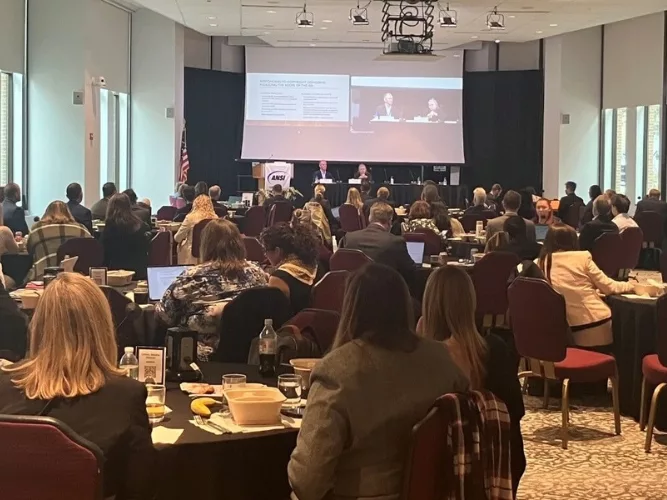What are some of the most pressing legal issues facing the standardization community? ANSI and its constituents explored three critical topics at ANSI’s Legal Issues Forum, as part of World Standards Week 2024.
The Nov. 14 event, held in Washington, DC, brought together approximately 300 stakeholders in-person and online from the public and private sectors for three discussion sessions.
Navigating the Impact of the Supreme Court's Loper Bright Decision offered a history of the Chevron deference doctrine, and the future outlook of statutory and regulatory interpretation now that Loper Bright has overturned Chevron and the constraints it placed on judicial judgment. Moderator Harley L. Geiger of Venable LLP led the discussion with panelists Thomas A. Berry of the Cato Institute; Kristin Hickman of the University of Minnesota Law School; Cameron F. Kerry of The Brookings Institution; Richard Pierce of George Washington Law School; and Michael E. Herz of Cardozo School of Law. Speakers noted that Loper Bright still allows courts to consider agency interpretations and implementations of ambiguous statutes, but the decision turns back the clock to a time when courts across the country had freedom to issue inconsistent interpretations of federal statutes. The speakers observed that this new regulatory landscape may lead to more informal avenues of policy making, like agency guidance or voluntary consensual frameworks. The private sector can expect more regional variance in the interpretation of federal statutes, and potentially more statutory ambiguities and gaps that can be addressed through standards activities.
New Legal Developments Impacting the Practice of Incorporation by Reference (IBR) continued the ongoing discussions in the standardization community surrounding the increasing risk of loss of copyright protection for standards that are incorporated by reference into regulation. Attendees heard the latest insights from Kevin Fee of DLA Piper and Miriam Vincent of the Office of the Federal Register on ideas for minimizing the risk of copyright challenges to IBR’d standards. Fee analyzed recent decisions on point from the United States Court of Appeals for the District of Columbia Circuit and the United States Court of Appeals for the Fifth Circuit. Vincent offered potential alternatives to IBR in response to copyright concerns, including use of an excerpt or portion of a standard with attribution and permission; providing alternate means of compliance; and deferring to a private entity through an established regulatory process.
What the Standards Community Needs to Know about Data Security Regulations, Practices and Standards explored the increasingly complex digital environment and associated challenges with protecting and securing data assets. Moderator Matthew Travis of The Cyber AB spoke with panelists Alex Joel of the American University Washington College of Law; Brandon Pugh of R Street Institute; Ron Ross of NIST; Sarah Scafidi of SentinelOne; and Justin Sherman of the Duke University Sanford School of Public Policy. Panelists emphasized the interconnection of data protection, privacy and cybersecurity; this interplay requires the government to work closely with the private sector to increase protections for national security. Competing regulations and lengthy standardization processes can be at odds with fast-moving technology developments, and individual technology users are often the weak point where security may be breached so it is vital to increase cybersecurity awareness and deploy the latest best practices. Attendees were encouraged to share input and expertise with the public sector to support more effective data security regulations.
ANSI thanks all moderators, panelists, and attendees for participating in this event.





